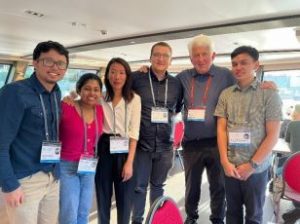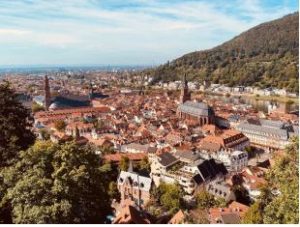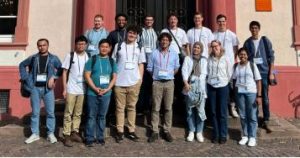Vinesha Peiris
Centre for Optimisation and Decision Science, Curtin University
10th Heidelberg Laureate Forum Report
The 10th Heidelberg Laureate Forum (HLF) took place in the beautiful city of Heidelberg,Germany, from the 23rd to 30th of September 2023. Every year, HLF organisers carefully select 200 young researchers (100 researchers from each discipline: maths and computer science) to interact with the Laureates, the greatest minds in the history of maths and computer science. This is such a unique opportunity to interact and share our own stories about ups and downs of research with others.
Figure 1: Beautiful Heidelberg city.
This year, I was fortunate enough to be able to attend HLF’s special 10-year celebration as a post-doc researcher thanks to the generous support provided by the AMSI AustMS Heidelberg Laureate Forum Travel Fund and Centre for Optimisation and Decision Science at Curtin University.
The schedule was jam-packed with a variety of events, including panel discussions, institution visits, talks by the laureates, workshops presented by HLF Alumina, career. development discussions, etc. There were also many entertaining events going on, such the Neckar River boat ride, the Bavarian night, the Heidelberg Castle visit, city tours, and movies. Throughout this whole week of networking, we were given plenty of opportunities to meet young researchers and expand our network by exchanging business cards that HLF organisers provided us with (genius idea). Furthermore, we got many chances during the forum to converse casually with laureates about our ordinary lives and studies. Even though the whole week in Heidelberg was interesting and fun, there are a few special sessions that will stay with me forever. The very first lecture on the very first day was given by Robert Melancton Metcalfe who won the ACM A.M. Turing Award in 2022 for his work on invention, standardisation and commercialisation of Ethernet. He came to the stage with no slides, but a piece of paper and talked about his journey through research while keeping all of our undivided attention to every simple detail he said.

Figure 2: A picture with Robert Metcalfe and some young researchers who are now lifelong friends.
The other session was the small group interactions with laureates. I selected the group which was led by Hugo Duminil-Copin (Fields Medal 2022) and we talked about many different general things like work-life balance, role models, his journey through maths, how to select a math problem to work on, etc. I hope the HLF organisers will include more small group interactions in the future HLF events.
Figure 3: A group picture taken after small group interaction with Hugo Duminil-Copin.
On the top of that, I particularly enjoyed the panel discussion on the topic, ‘Women in Mathematics’. It was amazing to hear stories of women from different parts of the world and how their lives evolved around maths and related research and the obstacles they had to face decades ago in a men dominated culture. Moreover, the final pieces of advice that we received from the panel members will be stuck with me forever. Finally, a round of applause to all the young researchers for doing what they are doing best at. It is impossible to talk to all the young researchers who attended the HLF this year, but every single person I met are amazing. They are extremely passionate about what they are doing and open to any discussions. Meeting people with similar interests and dreams actually provided the foundation for lifelong friendships. This amazing networking event ended up with a tour around the Heidelberg Castle, paired with a delicious dinner. It was one of the hardest goodbyes ever, hoping that we all will see each other at some point in life. I cannot stress enough how important it is for young researchers in maths and computer science to network with others in different parts of the world. Indeed, it is difficult to picture a more fitting stage for networking other than the Heidelberg Laureate Forum. I highly encourage and recommend HLF to all the young researchers in Australia to participate the HLF forum which is a once in a lifetime opportunity.
Where are you in your career?
I completed my PhD in 2022 and currently I am working as a Research Associate at the Centre for Optimization and Decision Science, Curtin University.
Why do you want to attend the HLF?
The Heidelberg Laureate Forum is the perfect place to meet like-minded people and masterminds behind the development of Mathematics and the Computer Science in the last few decades. This is the perfect opportunity to learn everyone’s unique story and motivation behind their work and pass it to the next generation of researchers.
Tell us about your research?
My main research interests are in the broad area of Optimisation, Approximation Theory and their applications in Neural Networks and DeepLearning. My focus is mostly on rational and generalised rational approximations. Optimisation problems appearing in univariate rational Chebyshev approximations are quasiconvex. Moreover, this property remains valid when the basis functions are not restricted to monomials (generalised rational Chebyshev approximation) and also in the case of multivariate settings. We use this property to develop numerical methods and investigate potential applications in different fields.
What are your favourite applications of your work?
Rational and generalised rational approximations in uniform norm have many applications in different fields. We use these approximations as a preprocessing step to deep learning classifiers and demonstrate that the classification accuracy is significantly improved compared to the classification of the raw EEG signals. We generated some nice figures to visualise the approximations and to date, it is my favourite application.
If you could meet any Fields Medalist or Abel Prize winner which, would it be and why?
It would be the second women Fields medallist, Maryna Viazovska who works on sphere packing problems. Proofs that she provided for higher dimensional sphere packing problems are very interesting to see and of course, her own experiences will serve as inspiration for many female Mathematics researchers.


